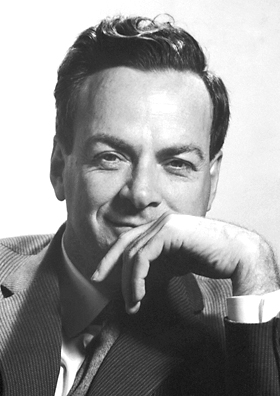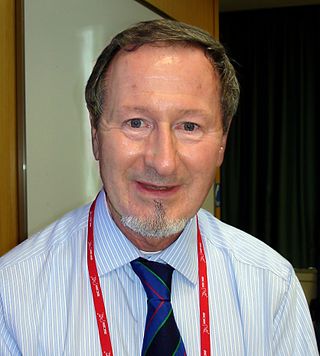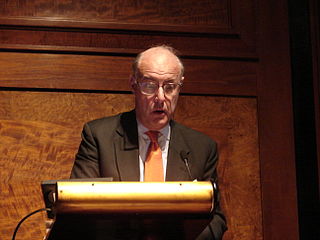
"There's Plenty of Room at the Bottom: An Invitation to Enter a New Field of Physics" was a lecture given by physicist Richard Feynman at the annual American Physical Society meeting at Caltech on December 29, 1959. Feynman considered the possibility of direct manipulation of individual atoms as a more robust form of synthetic chemistry than those used at the time. Although versions of the talk were reprinted in a few popular magazines, it went largely unnoticed. It did not inspire the conceptual beginnings of the field of nanotechnology. Beginning in the 1980s, nanotechnology advocates cited it to establish the scientific credibility of their work.

Richard Phillips Feynman was an American theoretical physicist, known for his work in the path integral formulation of quantum mechanics, the theory of quantum electrodynamics, the physics of the superfluidity of supercooled liquid helium, as well as his work in particle physics for which he proposed the parton model. For his contributions to the development of quantum electrodynamics, Feynman received the Nobel Prize in Physics in 1965 jointly with Julian Schwinger and Shin'ichirō Tomonaga.

Douglas Dean Osheroff is an American physicist known for his work in experimental condensed matter physics, in particular for his co-discovery of superfluidity in Helium-3. For his contributions he shared the 1996 Nobel Prize in Physics along with David Lee and Robert C. Richardson. Osheroff is currently the J. G. Jackson and C. J. Wood Professor of Physics, Emeritus at Stanford University.
Eurisko is a discovery system written by Douglas Lenat in RLL-1, a representation language itself written in the Lisp programming language. A sequel to Automated Mathematician, it consists of heuristics, i.e. rules of thumb, including heuristics describing how to use and change its own heuristics. Lenat was frustrated by Automated Mathematician's constraint to a single domain and so developed Eurisko; his frustration with the effort of encoding domain knowledge for Eurisko led to Lenat's subsequent development of Cyc. Lenat envisions ultimately coupling the Cyc knowledgebase with the Eurisko discovery engine.

The Royal Aeronautical Society, also known as the RAeS, is a British multi-disciplinary professional institution dedicated to the global aerospace community. Founded in 1866, it is the oldest aeronautical society in the world. Members, Fellows, and Companions of the society can use the post-nominal letters MRAeS, FRAeS, or CRAeS, respectively.
The Slade Professorship of Fine Art is the oldest professorship of art and art history at the universities of Cambridge, Oxford and University College, London.
David Louis Goodstein is an American physicist and educator. From 1988 to 2007 he served as Vice-provost of the California Institute of Technology (Caltech), where he is also a professor of physics and applied physics, as well as the Frank J. Gilloon Distinguished Teaching and Service Professor.

"Surely You're Joking, Mr. Feynman!": Adventures of a Curious Character is an edited collection of reminiscences by the Nobel Prize–winning physicist Richard Feynman. The book, released in 1985, covers a variety of instances in Feynman's life. The anecdotes in the book are based on recorded audio conversations that Feynman had with his close friend and drumming partner Ralph Leighton.
Sir Douglas Arthur Montrose Graham is a former New Zealand politician. He was an MP from 1984 to 1999, representing the National Party.
Sir George Douglas Robb (1899–1974) was a New Zealand surgeon, medical reformer, writer, and university chancellor.
Dame Linda Jane Colley, is an expert on British, imperial and global history from 1700. She is currently Shelby M. C. Davis 1958 Professor of History at Princeton University and a long-term fellow in history at the Swedish Collegium for Advanced Study in Uppsala. She previously held chairs at Yale University and at the London School of Economics. Her work frequently approaches the past from inter-disciplinary perspectives.

Sir David Nicholas Cannadine is a British author and historian who specialises in modern history, Britain and the history of business and philanthropy. He is currently the Dodge Professor of History at Princeton University, a visiting professor of history at Oxford University, and the editor of the Oxford Dictionary of National Biography. He has been the president of the British Academy since 2017, the UK's national academy for the humanities and social sciences. He also serves as the chairman of the trustees of the National Portrait Gallery in London and vice-chair of the editorial board of Past & Present.

QED: The Strange Theory of Light and Matter is an adaptation for the general reader of four lectures on quantum electrodynamics (QED) published in 1985 by American physicist and Nobel laureate Richard Feynman.

AnnaSophia Robb is an American actress, model, and singer. She began as a child actress on television, making her leading debut as the titular role in Samantha: An American Girl Holiday (2004). She made her feature film debut in Because of Winn-Dixie (2005), followed by the supporting role of Violet Beauregarde in Tim Burton's Charlie and the Chocolate Factory (2005). Her performance as Leslie Burke in Bridge to Terabithia (2007) garnered her recognition and praise, and two Young Artist Awards. Her subsequent film roles include Race to Witch Mountain (2009), Soul Surfer (2011), and The Way Way Back (2013). She received wider recognition and praise for playing the lead role of Carrie Bradshaw on The CW's series The Carrie Diaries (2013–2014). In 2019, she played the role of Gypsy Blanchard's neighbor Lacey in the Hulu miniseries The Act.
A sequence of six consecutive nines occurs in the decimal representation of the number pi, starting at the 762nd decimal place. It has become famous because of the mathematical coincidence, and because of the idea that one could memorize the digits of π up to that point, and then suggest that π is rational. The earliest known mention of this idea occurs in Douglas Hofstadter's 1985 book Metamagical Themas, where Hofstadter states
I myself once learned 380 digits of π, when I was a crazy high-school kid. My never-attained ambition was to reach the spot, 762 digits out in the decimal expansion, where it goes "999999", so that I could recite it out loud, come to those six 9's, and then impishly say, "and so on!"
The Messenger Lectures are a series of talks given by scholars and public figures at Cornell University. They were founded in 1924 by a gift from Hiram Messenger of "a fund to provide a course of lectures on the Evolution of Civilization for the special purpose of raising the moral standard of our political, business, and social life", to be "delivered by the ablest non-resident lecturer or lecturers obtainable". The lecture series has been described as one of Cornell's most important of extracurricular activities.

The Feynman Lectures on Physics is a physics textbook based on some lectures by Richard Feynman, a Nobel laureate who has sometimes been called "The Great Explainer". The lectures were presented before undergraduate students at the California Institute of Technology (Caltech), during 1961–1963. The book's co-authors are Feynman, Robert B. Leighton, and Matthew Sands.

The Meaning of It All: Thoughts of a Citizen Scientist is a non-fiction book by the Nobel Prize-winning physicist Richard Feynman. It is a collection of three previously unpublished public lectures given by Feynman in 1963. The book was first published in hardcover in 1998, ten years after Feynman's death, by Addison–Wesley. Several paperback and audiobook editions of the book have subsequently been published.

Hadley Alexander Wickham is a New Zealand statistician known for his work on open-source software for the R statistical programming environment. He is the chief scientist at Posit, PBC and an adjunct professor of statistics at the University of Auckland, Stanford University, and Rice University. His work includes the data visualisation system ggplot2 and the tidyverse, a collection of R packages for data science based on the concept of tidy data.









